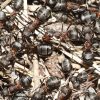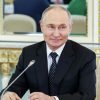 During the First World War, William Young (left), Jack Knight's great-great-grandfather, rescued a wounded comrade in no man's land
During the First World War, William Young (left), Jack Knight's great-great-grandfather, rescued a wounded comrade in no man's land
Fighting the weight of the dead comrade on a stretcher, four Ukrainian soldiers took what seemed to be the fastest route out of the battlefield.
Rather than clamber over rubble and debris and risk breaking an ankle, they took a shortcut through a patch of tall grass. Then, when the going became easier, a high-explosive mine exploded, followed by another, resulting in two of them being seriously wounded.
For Jack Knight, a British war volunteer, what happened next was not exactly textbook.
As a former Royal Engineers sapper, he realized that the meadows were likely littered with more mines. But as the fighting raged around him, and two Ukrainians risked bleeding, he saw no other choice but to follow them.
“The guys with them froze, like anyone else in such a situation. and I knew I needed to come and help,” he said.
“It was dark, so there was no way to see where you were going anyway, so I just held my breath and went in blind. Later I thought to myself: “What the hell are you doing there?”, but at that moment all you think about is the lives of other people.”
Knight then led the wounded Ukrainians back to safety — only two of the eight comrades he helped rescue during a grueling 14-hour rescue mission that night, much of it under fire.
However, no matter how terrifying they were, footsteps also rushed through the minefield. a long-standing family tradition.
During World War I, William Young, his great-great-grandfather, saved a wounded comrade in no man's land, despite being shot twice by German snipers in the process.
He received the Victoria Cross and still has it. a street named after him in Preston. “Having an ancestor like that in your family is a lot to live up to,” Mr. Knight said.
 Jack Knight's great-great-grandfather, William Young, is in hospital, demonstrating the extent of his jaw and head injuries. Photo: The War Illustrated
Jack Knight's great-great-grandfather, William Young, is in hospital, demonstrating the extent of his jaw and head injuries. Photo: The War Illustrated
The 30-year-old from south-east London is one of many Western volunteers serving with Chosen Company, a unit of Americans, Canadians and Europeans attached to the 59th Mechanized Brigade of Ukraine.
For the past few months they have been at the northeastern end of the current opposition. -offensive, in the thick of battles around the city of Bakhmut.
Much of the battlefield, he said, was familiar to his great-great-grandfather, who fought in northern France.
There are miles of trenches, constant artillery duels — and times like that long night. last month when the best-laid plans suddenly went awry.
After weeks of steady progress against the Russians, four 12-man squads of Chosen Company were tasked with attacking a number of enemy positions.
p>  Jack Knight (left) with one of the friends he rescued from a minefield in Ukraine
Jack Knight (left) with one of the friends he rescued from a minefield in Ukraine
Mr Knight, being a sapper, was to remain with the other three until the assault was over, after which they were to be brought in to clear the mined road . However, once the attack began, it became clear that the Russians had reinforced their troops.
“Everything was going well, and then we started hearing on the radio that we were having more and more casualties,” Mr. Knight recalled.< /p>
“First it was 10, then 15, then 20, and then 25… all within 20 minutes. We saw that the situation was getting very bad and I realized that we would not be able to clear the mines, so we decided to act as a casualty evacuation team instead.»
With artillery fire and small arms exchanged around them, the team made their way over half a mile of no man's land to a forward position where two comrades lay badly wounded. Then, one by one, they pulled them back, a task that was as tedious as it was dangerous.
“It's one of the most physically demanding things you'll ever do in combat—the first guy probably , weighed about 120 kilograms, and we are trying to carry it through bunkers, trenches and rubble, all the while having to stop to avoid machine gun fire. Usually there are six people on stretchers per shift, plus two per shift, but there were only four of us,” Mr. Knight said.
Stepped on a landmine
Carrying the stretcher was so tiring that during the second rescue mission, Mr Knight and his American comrade Wayne Hallat abandoned their weapons and grenades to reduce the weight they were carrying. The next victims, almost a mile from the neutral zone, were three wounded volunteers and two Americans, Andrew Webber and Lance Lawrence, both of whom already lay dead.
When the rescue party set off. , a Ukrainian comrade walking just five meters from Mr. Knight, stepped on a mine and received a shrapnel wound to the face.
Meanwhile, a Russian drone appeared overhead. «Luckily he didn't lose his leg so we were able to retreat to cover before the drone flew away, but it was another 'Oh crap' moment,» Mr Knight said.
After moving forward again, the rescue team reached five casualties. As a group of Ukrainian soldiers began to stretch Lawrence's body backwards, they wandered into a minefield in the tall grass. Following them, Mr. Knight then helped them out, carrying one of the wounded on his back.
Nominated for a medal
It was not until dawn the next day that the extraction mission was completed. At one point, while hiding behind a wall, Mr. Hallat heard the voices of Russian soldiers just 20 meters away. Throwing away his weapon, he grabbed two pieces of stone the size of baseballs and prepared for a fight to the death if they noticed him.
“I decided to throw stones at them — they would be grenades at first, but they could distract them enough that I could attack one of them, grab his gun and shoot several times,” he said. «I probably wouldn't have survived, but if I could have caused some casualties, they might have retreated rather than continuing towards our positions.»
Both Mr. Knight and Mr. — Mr. Hallat is now nominated for a medal. for their conduct in the battle, in which 27 of their comrades were wounded.
«I hope my great-great-grandfather will think I did my bit,» Mr Knight said. “Every rescue operation literally felt like a suicide mission.”


























































Свежие комментарии